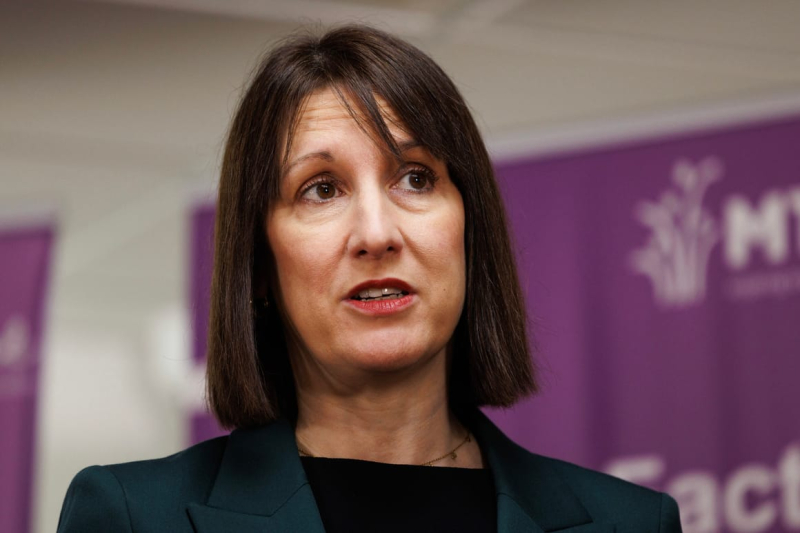Borrowing costs hit 17-year highs and sterling falls as the budget and Donald Trump’s imminent return dent confidence.
U.K. Chancellor Rachel Reeves is running into the same problem as former Prime Minister Liz Truss. The markets don’t like her plans to break Britain’s chronic economic issues.
A depreciating pound and a sharp sell-off in U.K. government debt over the past two days are worrying signs that investors may be losing faith in Britain’s long-term financial stability.
The pound has tumbled against the dollar this week and hit a new 14-month low in early trading on Thursday. It also hit a two-month low against the euro. Most worryingly for the government, its benchmark borrowing costs hit a new 17-year high on Thursday, almost reaching 5 percent before easing a little. They’re now well above the levels seen two years ago when the Truss ‘mini-budget’ sent shockwaves through local markets, pushing some pension funds to the verge of bankruptcy.
Chief Secretary to the Treasury Darren Jones, deputizing in the House of Commons for Reeves, blamed international developments, saying: “It is normal for the price and yields of gilts to vary when there are wider movements in global financial markets.”
“There should be no doubt as to the government’s commitment to economic stability and sound public finances,” he added.
But Shadow Chancellor Mel Stride said the developments were evidence of “yet another Socialist government taxing and spending its way into trouble.”
This time is (a bit) different
Analysts say the turbulence stems largely from a blend of international and domestic pressures. But it casts a harsh light on some long-standing problems in the U.K. economy: slow growth, low levels of productivity, and high levels of debt. Those were the same problems that Truss faced, and they haven’t gone away under Labour Prime Minister Sir Keir Starmer.
There are differences between now and then: the Truss mini-budget, based on unfunded tax cuts, created a vicious cycle of forced selling by U.K. pension funds, pushing them to the verge of bankruptcy and forcing the Bank of England to stabilize the situation. There’s no sign of that this time around.
Another difference is the role of global bond markets. Investors have sold U.S. bonds heavily in anticipation of Donald Trump’s return to power, fearing that he will stoke inflation with his policies on tariffs and deportations. Over the last month, U.K. 10-year yields — that is, the price at which the government borrows — have only risen 0.06 percentage point more than U.S. ones.
At first glance, that would seem to be consistent with the fact that the U.S. typically sets the tone for global financial markets. However, U.S. economic data has improved in that time, whereas British data has pointed to a sharp slowdown. Generally, yields fall when growth slows.
“The U.K. isn’t alone in Europe in facing persistently weak productivity growth,” said Simon Wells, chief European economist at HSBC. “Yet its high short and long-term interest rates are comparable to those of the faster-growing U.S. … It feels like the worst of all worlds.”
A new black hole
Whatever the cause, higher borrowing costs spell trouble for Reeves. Deutsche Bank analysts Sanjay Raja and Shreyas Gopal estimate that the increase in yields since the budget in October will have added an extra £10 billion in spending per year — eating up all of her room for maneuver within the new rule she set for herself back then.
As a result, they argued, she may need to cut spending (the budget raised spending by £70 billion), raise taxes or borrow more to cover the emerging hole in the public finances.
Any one of those would mean huge trouble for the government: Reeves has already said she won’t raise taxes further. Raising borrowing (and thus breaking her own rule) would hurt her credibility with markets, and cutting spending would anger voters.
“I think investors were already nervous about the growth outlook post-Brexit,” said Ken Egan, senior director at credit ratings agency KBRA. “Perhaps now there is some disappointment that measures introduced in the U.K. government budget, like increases to National Insurance contributions (NICs), will further weigh on growth and possibly stoke inflation.”
In a survey published by the Bank of England on Thursday, over half of firms said they would respond to the NIC increase by raising prices and by cutting jobs, while 39 percent said they would pay lower wages than they would otherwise have done.
To make things worse, the Bank of England is still selling gilts back into the market as part of its monetary policy, something known as quantitative tightening. That’s all adding to the amount of bonds that need a buyer. Analysts at Lloyds Bank reckon that the net supply of gilts to the market this year will be around three times what it was a decade ago.
Pooja Kumra, a strategist with TD Securities, said that, for now, at least, things are still orderly, in contrast to 2022. Even so, she said, “it’s happening and hurting lots of investors. It can get disorderly if it’s not kept under control.”
(This article has been updated.)

